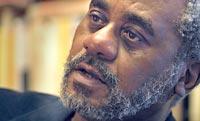Charles Johnson: Questions of literature and life

"Dr. King's Refrigerator and Other Bedtime Stories"
by Charles Johnson
Scribner, 144 pp., $20
edited by Jim McWilliams
University of Washington Press, 336 pp., $40, $22.50 paper
The image of the writer as a brilliant loner is a popular one, but that description certainly doesn't fit Charles Johnson. As a professor of English at the University of Washington for almost 30 years, he has taught creative writing to many hundreds of college students.
Johnson's sense of the role of the individual in society is a thread that runs through both "Dr. King's Refrigerator," his latest collection of short fiction, and "Passing the Three Gates," a compilation of interviews with the author that spans from 1976 to 2003.
The interviews in "Passing the Three Gates" are remarkably consistent in subject matter and literary attitude. For Johnson the questions of literature are the same as in life: Who am I? What is my relationship to the society I live in? How do I balance my own desires with other people's values and experience?
Johnson's decision in his mid-20s to explore issues of identity led him away from naturalistic fiction ("I'd written six apprentice novels, all bad imitations of Baldwin, Wright and John A. Williams," he tells interviewer George Myers Jr.) to the philosophical novel. Johnson's writing mentor, novelist John Gardner, was a guiding force in his literary education. In a 1990 interview with M.L. Lyke, he says, "Sometimes I would pass my stories by Gardner, and I still remember his remarks. He'd say, 'You did this before. You're relying on what you figured out in the last story.' "
Creating stories that explore ideas in social, political and spiritual ways has prompted Johnson to write in many forms, including scripts for movies and television. "Dr. King's Refrigerator" includes the subtitle "And Other Bedtime Stories." Bedtime stories is an apt description, as these short works often deal with miraculous moments and tests of character.
The richest stories are fables about the power of imagination to unite or destroy.
In the title story, Johnson shows us Martin Luther King as a young husband and minister stuck on a sermon in the middle of the night. Opening his refrigerator for a midnight snack, he has a vision of the interdependence of all things: "He looked around the disheveled room, and he saw in each succulent fruit, each slice of bread, and each grain of rice a fragile, inescapable network of mutuality in which all earthly creatures were codependent, integrated, and tied in a single garment of destiny." In "The Gift of the Osuo" Johnson revisits the Allmuseri, the African tribe he invented for his National Book Award-winning novel "Middle Passage" (1990). Granted a gift of magic chalk by two of his osuo (sorcerers), King Shabaka draws the future of his people in ways he can imagine but cannot control.
"Kwoon" is a gritty martial-arts meditation on pain, self-awareness and humility. Here Johnson shows us a connection between brutality and compassion that is fresh and original.
Other stories seem trifles. "Sweet Dreams" is about a dream tax and reads like an underwritten episode of the "Twilight Zone." "Cultural Relativity" is a cute adult fairy tale about the upsetting power of the kiss, and "Better Than Counting Sheep" is a lame academic joke.
The oddest entry is "Executive Decision." The story first appeared in a 1997 publication titled: "Outside the Law: Narratives on Justice in America." Johnson introduces a white CEO who has to weigh the résumés of two job candidates: a white woman and a black man. Verdict: as a case study on affirmative action, yea; as a believable story, nay.
Whatever he chooses to write about, Johnson remains one of the Northwest's most committed and interesting artists. Cartoonist, essayist, photojournalist, novelist, Buddhist — just about any "ist" you can describe — he is a man who writes serious fiction, who doesn't flinch from showing the ugliness of human behavior or presenting precious individual acts of humor and wisdom.
Richard Wallace is a Seattle writer and the live theater coordinator for The Museum of Flight.
Coming up: Charles Johnson
![]()
![]()
The author of "Dr. King's Refrigerator
and Other Bedtime Stories" will read at 7:30 p.m. Feb. 10 at the Elliott Bay Book Co., 101 S. Main St. in Seattle. Free (206-624-6600; www.elliottbaybook.com).